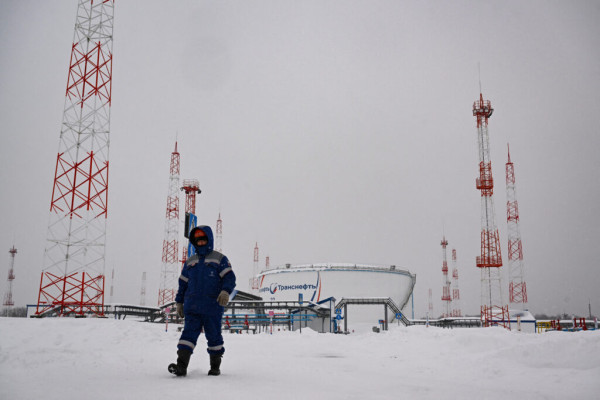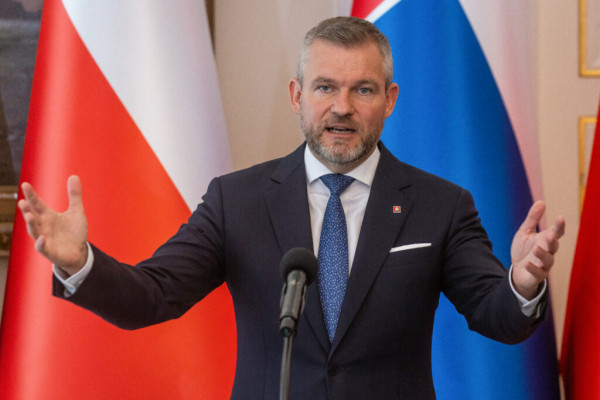You’ve had two years: EU eyerolls at Hungary’s request for help with Russian oil
BRUSSELS — You reap what you sow.
Privately, that’s the exasperated sentiment among EU diplomats as Hungary joins with Slovakia to try and leverage EU rules to preserve access to a discounted product nearly everyone else has had to shun: Russian oil.
Their maneuvering comes in the wake of Ukrainian sanctions blocking the transit of pipeline crude sold by Russia's largest private oil firm, Lukoil, which could strip the two countries of a third of their oil imports.
Hungary and Slovakia have gone to the rule book, arguing the penalties violate a 2014 trade deal between Kyiv and the EU and asking the European Commission, the EU’s executive, to intervene.
The request has put the EU in a bind. Officials know they must go by the book — and have done so, issuing numerous statements saying they are reviewing the facts and exploring options. But behind the scenes, and in discussions among EU diplomats, there is considerable frustration that this problem is even on Brussels’ agenda.
Everyone else in the EU has found ways to get off Russian oil, several diplomats fumed — it’s not their problem Hungary and Slovakia used a sanctions carveout to keep pumping it in. Hungary has even ramped up Russian oil imports, drawing particular ire.
“Many EU members took costly but necessary efforts to get rid from dependence on Russian gas and oil … mainly because it stinks of blood,” said one EU diplomat, who like others for this story was granted anonymity to speak candidly.
“It seems that Hungary has issues not only with its olfactory system but with its mindset and a lack of determination to get rid of dependencies,” the diplomat added.
Ukraine, meanwhile, has argued its sanctions are aimed at throttling a key source of income for Russia's war effort. On Friday, Ukrainian presidential aide Mykhailo Podolyak said the move had “nothing to do with blackmail.”
The comments come as EU animosity toward Budapest grows, with countries increasingly fed up with Hungarian Prime Minister Viktor Orbán over his friendly Russia ties and persistent efforts to stall sanctions. Slovakia, too, is increasingly rankling the EU, as populist Prime Minister Robert Fico pivots Bratislava towards a more pro-Russia stance and suspends state-sponsored military aid to Ukraine.
That’s left few receptive ears in Brussels now that both countries are requesting help to keep their Russian oil.
Just desserts
Following Moscow’s full-scale invasion of Ukraine in 2022, the EU imposed an embargo on imports of Russian oil — a key lifeline that remains one of the primary sources of revenue for the Kremlin’s war effort.

But it exempted pipeline supplies — including those coming to Hungary, Slovakia and the Czech Republic via the Druzhba pipeline — to give those countries time to find alternative supplies, with the understanding they would do so rapidly.
Germany and Poland, who also imported supplies from Druzhba, stopped buying Russia’s crude last year. The Czech Republic aims to end its imports from Moscow by 2025, while Slovakia too has begun upgrading its primary refinery to process more non-Russian crude.
But Hungary chose to go the other way, instead ramping up oil imports via the pipeline by 50 percent compared to 2021. Budapest also inked new deals with Russian gas giant Gazprom.
Now, Hungary and Slovakia want Brussels’ help.
At a meeting of the EU’s main trade dispute body last week, the two countries demanded the Commission begin formal consultations with Ukraine over the ban, arguing the EU executive legally had three days to step in, according to two diplomats briefed on the meeting.
But the Commission batted the two countries away, arguing it needed more time to assess the claim and arguing it had no obligation to respond so quickly, the diplomats said.
The EU executive also said Ukraine could in some circumstances suspend parts of the trade deal on security grounds, the diplomats recounted, with 11 EU countries taking the floor in support of the Commission’s intervention.
“I don’t think the Commission is eager to help Hungary,” said a fourth EU diplomat. Hungary and Slovakia, they added drily, “should have not gone to Moscow.”
The EU executive declined to comment. On Thursday, Olof Gill, the Commission's trade spokesperson, told reporters the Commission would “make a decision when [it was] ready to make a decision.”
Scare tactics
Sensing opposition from inside the bloc, Hungary and Slovakia have resorted to threats while quietly looking at other options behind the scenes.
Last week, Budapest’s Foreign Minister Péter Szijjártó said Hungary would continue to hold up EU military aid to Ukraine until the sanctions are lifted, adding the country supplies 42 percent of Kyiv’s electricity imports.
Slovak President Peter Pellegrini said that Ukraine should “put things in order as soon as possible” or else Slovakia would “eventually have to take some retaliatory measures.”

On Monday, Fico threatened to slash diesel exports to Ukraine — which make up a tenth of the country’s consumption — unless the sanctions are lifted. Top Slovak government officials have previously hinted they could stop electricity supplies too.
But that looks more “like an argument you use to sway negotiations in [their] favor” than genuine threats, said Krzysztof Dębiec, a senior fellow at the Warsaw-based Centre for Eastern Studies think tank and a Central Europe expert.
Partly, that’s because both countries continue to profit from energy exports to Kyiv, he said, and they would face heavy blowback from the EU for slashing power exports to a war-torn Ukraine that is already facing sweeping blackouts.
Hungary and Slovakia's governments didn't respond to requests for comment from POLITICO.
Both countries now face energy price spikes and fuel shortages in the coming weeks. Their refineries also face a “significant credit risk,” the Fitch ratings agency said last week.
But any crisis won’t be immediate: EU countries are required to hold 90 days worth of emergency oil reserves in storage.
They also have other options for sourcing supplies, according to Martin Vladimirov, energy director at the Center for the Study of Democracy think tank, including ramping up non-Russian crude imports from Croatia via the Adria pipeline. Croatia’s energy ministry didn’t respond to a request for comment.
Meanwhile, Slovakia's Fico on Friday proposed an undefined “technical solution” to restore blocked supplies after a meeting with Ukrainian Prime Minister Denys Shmyhal. Gergely Gulyás, an aide to Hungarian leader Viktor Orbán, also said the country was exploring “a legal loophole that allows the oil to be transferred by someone not affected by the sanctions.”
That could mean increasing imports via Druzhba from Kazakhstan, Vladimirov said, or other Russian firms using the pipeline including Gazprom Neft or Rosneft, which are not sanctioned.
In the meantime, Budapest and Bratislava “have been very hypocritical,” Vladimirov said.
“They have been actually benefitting directly economically from their close proximity to the Ukrainian market reselling cheap Russian energy sources at a huge premium,” he said, all “while withholding supply of weapons and while also being trojan horses for Russia in Europe.”
This article has been updated.